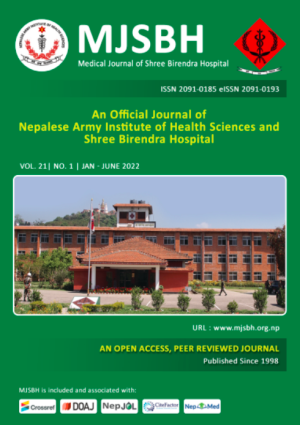State of Psychological Well-being and Self-Care Patterns Among Paramedic Trainees During the First Wave of COVID-19
DOI:
https://doi.org/10.3126/mjsbh.v21i1.37191Keywords:
Anxiety, Coping, Depression, Health worker, Mental HealthAbstract
Introduction: Several studies suggest that health workers and medical students suffer from psychological problems during the pandemic. Paramedic trainees were doing duty at the hospital round the clock as other trainee health care workers during the first wave of COVID-19, but there was no published study regarding mental health issues of paramedic trainees till the date in Nepal. This study aims to assess their well-being to full fill the gap.
Methods: This is a descriptive, cross-sectional study design carried out with 280 paramedics. The study period was September - October 2020. Depression, anxiety and stress scale – 21 (DASS 21) and self - care assessment worksheet was used to collect the data after getting permission from the concerned authors.
Results: The point prevalence of psychological problems as defined by DASS-21 was 117 (45.3%). Specifically, DASS-21 sub-scales-defined caseness was: Depression 31 (12.0%), anxiety 55 (21.3%) and stress 31 (12.0%), where 218 (80%) of participants were not taking any self-help care-related training to enhance their coping skills to date. Chi-square (χ2) test found that there was a significant association between emotional self-care and severity of depression (P = 0.001), anxiety (P = 0.03) and stress (P = 0.04).
Conclusions: A significant number of paramedic trainees suffered from depression, anxiety and stress during the first wave of the COVID-19 Pandemic. Therefore, psychological interventions like stress management, positive coping skills, and self-care training may be beneficial to help them cope with the situation.
Downloads
Downloads
Published
How to Cite
Issue
Section
License
Copyright (c) 2022 Medical Journal of Shree Birendra Hospital

This work is licensed under a Creative Commons Attribution-NonCommercial-NoDerivatives 4.0 International License.
This license enables reusers to distribute, remix, adapt, and build upon the material in any medium or format for noncommercial purposes only, and only so long as attribution is given to the creator.




